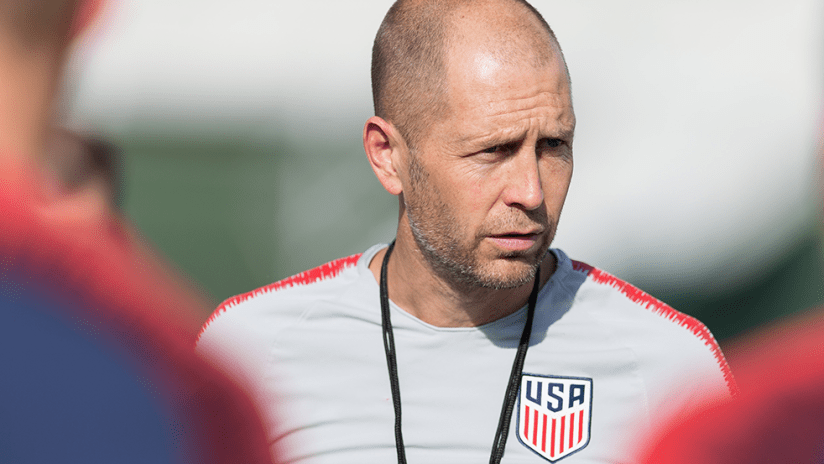Gregg Berhlater doesn't know when he's going to have his group of players together again, but the US men's national team head coach says he's doing what he can to give them support while the soccer world remains on pause amid the COVID-19 pandemic.
Berhalter joined the Chelsea Mike'd Up podcast with hosts Michael Ryan Ruiz and Chris Wittyngham on their episode released Thursday, mostly to talk about star USMNT and Chelsea attacker Christian Pulisic. But in between questions about the star midfielder, Berhalter talked about how U.S. Soccer is handling the layoff and what they're doing to maintain contact and offer support and guidance to the USMNT players.
"We're that second level, the clubs being the first level of support, we're the second level," Berhalter said. "What we're doing is we're looking at the [training] programs, we're seeing if there's any gaps in the programs, we're seeing how we can supplement them in any way, just giving the players support. We've been in communication with all the players, figuring out what they're doing and how we can help -- whether they need equipment, whether they need advice on supplements, whether they need advice on actual workouts or some ideas, we're there to help the players.
"The other thing we're doing with some of the younger guys is we are going through video and we're showing them positional profile videos and getting them up to speed with how we play. But we're just here to support them. It's a tough time for everyone in the world right now and as supportive as we can be, that's how we're going to help them."
Berhalter also talked about his philosophy on his preferences as to where his players play their club soccer compared to predecessor Jurgen Klinsmann, who would often publicly advocate for his players to move to Europe.
Berhalter said his view is that there's not necessarily a universal answer for where players should go and that he believes making sure that they're at a level that will challenge them and that they'll get consistent playing time are what he sees as the most important factors.
In the case of Pulisic, Berhalter said he's been pleased to see him find a scenario at Chelsea where he's being challenged at one of the highest levels in the world, and had been playing well with five goals and two assists in 16 top-flight appearances before sustaining a groin injury.
Asked about whether he felt there was enough consistency with Pulisic as far as where he's being deployed on the field between club and country, Berhalter said he sees Pulisic as a unique and versatile asset that can impact the game regardless of where he's lined up. The trick, he said, is the coaching staff continuing to figure out how to maximize those talents with rest of the personnel at his disposal whenever they're able to get back to training together.
"Part of it is he has such an ability to operate in space, he has such a good understanding of where space opens up and where to attack space and sometimes that leads him to leaving his position," Berhalter said. "Which, if you play a strict positional game, then you're going to have problems with that. Because what that means is now, say for example he's playing left wing and he's drifted into the middle and your fullback's not high to occupy the left back, now it can cause him to be easily marked.
"So you need this inter-change when he leaves his space. But what I've learned is you want to take advantage of the quality you have. As coaches, we need to adapt to that. When you have that high level of quality, we need to adapt to them."













